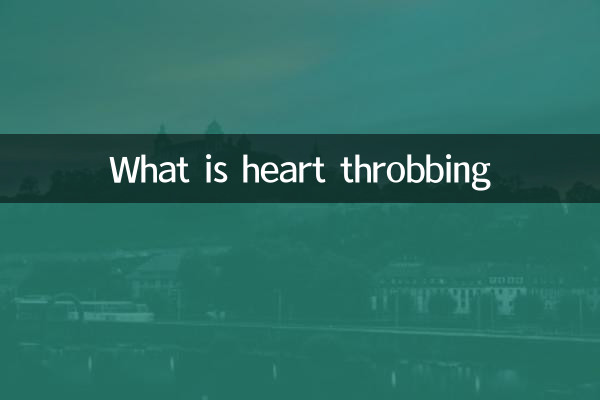What is heart throbbing
Heart throbbing is a common physiological or pathological phenomenon that usually manifests as abnormal heartbeat, palpitations, or chest discomfort. It can be caused by mood swings, exercise, caffeine intake, or potential heart disease. In recent years, heart health issues have attracted much attention, especially under the influence of high-intensity work pressure and bad living habits, heart throbbing has become a health hazard for many people. This article will combine popular topics and hot contents across the network for the past 10 days to analyze the causes, symptoms and response methods of heart throbbing.
1. Common causes of heart throbbing

There are many causes of heart throbbing, and here are some common causes:
| Cause Type | Specific performance |
|---|---|
| Emotional factors | Emotional fluctuations such as anxiety, tension, and excitement may cause your heart to be faster |
| Living habits | Excessive intake of caffeine, alcohol or nicotine |
| Drug effects | Certain cold medicines, weight loss medicines, or hormone drugs may cause palpitations |
| Disease factors | Arrhythmia, hyperthyroidism, anemia and other diseases |
2. Hot topics on heart health discussions across the network in the past 10 days
According to network data analysis, the discussion on heart health in the past 10 days mainly focused on the following aspects:
| Hot Topics | Discussion focus | Popularity index |
|---|---|---|
| Young people's heart health | How to prevent sudden death cases | ★★★★★ |
| Palpitations and anxiety | The effects of psychological factors on the heart | ★★★★ |
| Caffeine intake | Daily safe intake standards | ★★★ |
| Cardiac examination items | Which tests can detect problems early | ★★★ |
3. Typical symptoms of heart throbbing
The symptoms of heart throbbing vary from person to person, but usually include the following symptoms:
1.Abnormal heartbeat: Feeling that your heartbeat is too fast, too slow or irregular
2.Chest discomfort: Chest tightness, chest pain or feeling of pressure
3.Difficulty in breathing: Shortness of breath accompanied by palpitations
4.Dizziness and fatigue: In severe cases, fainting may occur
4. How to deal with heart palpitations
According to recent medical experts' recommendations, the following measures can be taken to deal with heart throbbing:
| Response measures | Specific methods | Applicable |
|---|---|---|
| Adjust your lifestyle | Regular work and rest, moderate exercise, quit smoking and limit alcohol | Mild palpitations |
| Psychological regulation | Meditation, deep breathing, psychological counseling | Anxiety-related palpitations |
| Medical Examination | Electrocardiogram, Holter monitoring, cardiac ultrasound | Frequent or severe palpitations |
| Drug treatment | Prescription drugs such as beta blockers | After the doctor's diagnosis |
5. Recent popular suggestions for preventing heart problems
In light of recent hotly discussed health topics on the Internet, the following preventive measures have attracted widespread attention:
1.Regular cardiac examinations: Especially for people over 35 years old, it is recommended to check once a year
2.Control pressure level: Learn stress management skills to avoid long-term high-pressure states
3.Eat reasonably: Reduce high-salt and high-fat foods and increase omega-3-rich foods
4.Exercise appropriately: Avoid sudden and intense exercise and maintain moderate aerobic exercise
5.Avoid staying up late: Ensure adequate sleep and maintain a normal biological clock
6. When do you need medical treatment?
Although most heart throbbing is benign, seek medical attention immediately:
- Palpitations are accompanied by chest pain, difficulty breathing or fainting
- Palpitations that last longer than a few minutes
- Have a family history of heart disease or a past history of heart disease
- Increased frequency of heart palpitations or worsening of symptoms
Heart health is an important part of overall health. Paying attention to early signs such as heart palpitations and taking timely preventive and treatment measures can effectively reduce the risk of serious heart disease. It is recommended that readers consider their own circumstances and consult a professional doctor when necessary to obtain personalized health guidance.

check the details

check the details